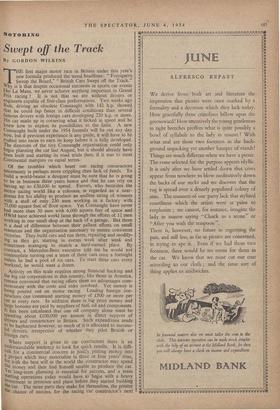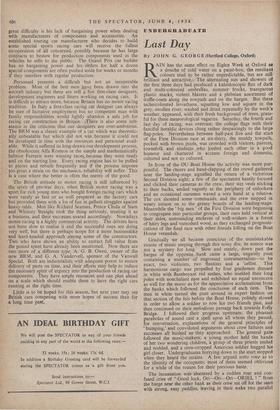ItIOTORING
Swept off the Track
BY GORDON WILKINS HE first major motor race in Britain under this year's new formula produced the usual headlines: " Foreigners Sweep the Board," " British Cars Swept off the Track." P.r Why is it that despite occasional successes in sports car events like Le Mans, we never achieve anything important in Grand Prix racing ? It is not that we are without drivers or engineers capable of first-class performances. Two weeks ago Rolt, driving an obsolete Connaught with 142 h.p. showed that he could lap faster in difficult conditions than several famous drivers with foreign cars developing 220 h.p. or more. His car made up in cornering what it lacked in speed and he knew how to exploit its possibilities to the limit. A new Connaught built under the 1954 formula will be out any day now, but if previous experience is any guide, it will have to be rushed into races to earn its keep before it is fully developed. The directors of the tiny Connaught organisation could only begin planning the car last August, but it should already have been built and starting its road trials then, if it was to meet Continental marques on equal terms.
Of the troubles which beset our racing constructors uncertainty is perhaps more crippling than lack of funds. To build a world-beater a designer must be sure that he is going to be in business three years hence and that he can rely on having up to £30,000 to spend. Ferrari, who bestrides the motor racing world like a colossus, is regarded as a near- genius for his ability to produce an endless string of winners with a staff of only 230 men working in a factory with 75,000 square feet of floor space. Yet Connaught have never had more than 30 men with 6,000 square feet of space and HWM have achieved world fame through the efforts of 12 men Working in one small shop at the back of a garage. But there IS a deal of difference between their gallant efforts on small resources and the organisation necessary to ensure consistent victories. They build cars and run them, repairing and modify- ing as they go, starting in events week after week and sometimes managing to snatch a hard-earned place. By Contrast, a Mercedes-Benz executive told me he would not contemplate turning out a team of three cars once a fortnight unless he had a pool of six cars. To start three cars every Weekend, he would want a dozen.
Activity on this scale requires strong financial backing and the big car corporations in this country, like those in America, remain convinced that racing offers them no advantages com- mensurate with the costs and risks involved. Yet money is being poured out on motor racing. Leading foreign con- structors can 'command starting money of £500 or more per ear at every race. In addition there is big prize money and large bonuses are paid by suppliers of fuel, oil and components. It has been calculated that one oil company alone must be sPending about £100,000 per annum in direct support of drivers and constructors in Britain. Such expenditure tends to be haphazard however, as much of it is allocated to success- 1;111 drivers, irrespectiVe of whether they pilot British or foreign cars. . great difficulty is his lack of bargaining power when dealing with manufacturers of components and accessories. An established touring car manufacturer who decides to build some special sports racing cars will receive the fullest co-operation of all concerned, possibly because he has large contracts to bestow for production components used in the vehicles he sells to the public. The Grand Prix car builder has no bargaining power and his orders for half a dozen special components are often pushed aside for weeks or months if they interfere with regular production.
Personnel presents a difficult but not an insuperable problem. Most of the best men have been drawn into the aircraft industry but there are still a few first-class designers, developnient engineers and fitters working on racing cars. It is difficult to attract more, bCcause Britain has no motor racing tradition. In Italy a first-class racing car designer can always be sure of lucrative employment but no competent man with family responsibilities would lightly abandon a safe job for racing car construction in Britain. There is also some sub- stance in the criticism that our designers are over-ambitious. The BRM was a classic example of a car which was theoretic- ally unbeatable but which did not win because it could not be developed in time with the resources and personnel avail- able. While it suffered its long-drawn-out development process, the obsolescent Alfa Romeos or the simple and mathematically Inferior Ferraris were winning races because they were ready and on the starting line. Every racing engine has to be pulled to pieces and rebuilt frequently and if the process imposes too great a strain on the mechanics, reliability will suffer. This is a case where the better is often the enemy of the good.
The British attitude to motor racing is still influenced by the spirit of pre-war days, when British motor racing was a sport for rich young men who bought foreign racing cars which were rarely as fast or as well prepared as the factory cars but provided them with a lot of fun in gallant struggles against heavy odds. Men like Richard Seaman, Prince Chula of Siam and Whitney Straight took the thing seriously, treating it as a business, and their successes soared accordingly. Nowadays motor racing is a highly commercial activity. The drivers have not been slow to realise it and the successful ones are doing very well, but there is perhaps scope for a more businesslike and hard-headed approach among some of the constructors. TWo who have shown an ability to extract full value from the pound spent have already been mentioned. Now there are two more of a different type, A. G. B. Owen, owner of the new BRM, and G. A. Vandervell, sponsor of the Vanwall Special. Both are industrialists with adequate power to ensure delivery of parts on time, and their efforts may help to induce he necessary spirit of urgency into the production of racing car components. They have ample resources and can plan ahead On a scale which should enable them to have the right cars running at the right time.
Little is to be hoped for this season, but next year may see British cars competing with more hopes of success than for a long time past.



































 Previous page
Previous page